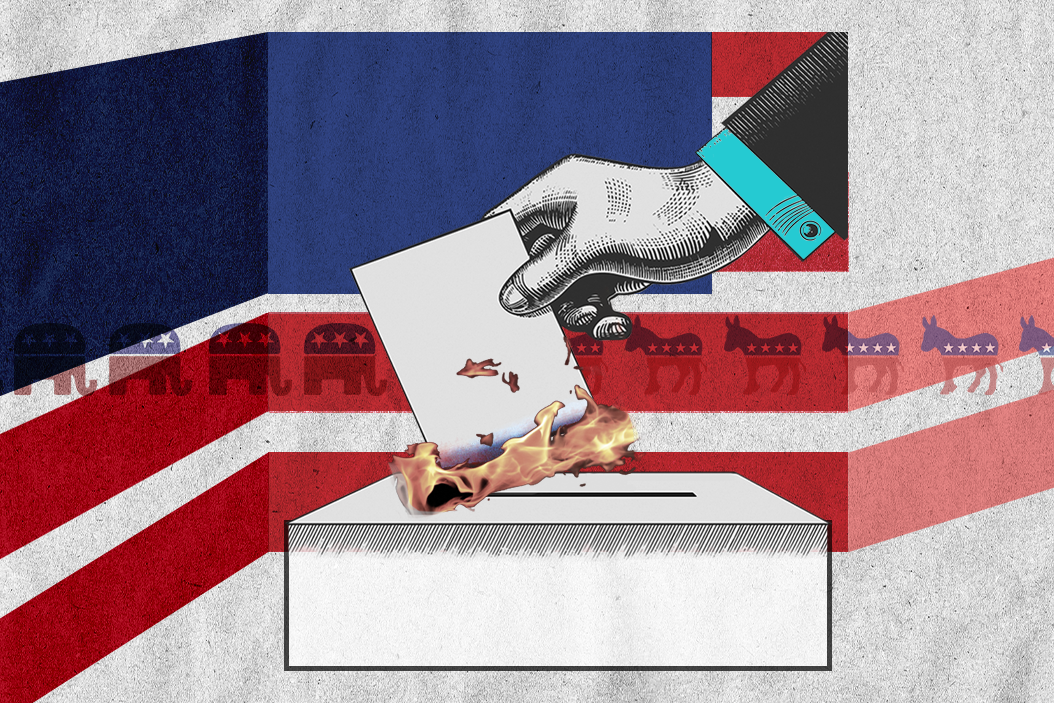January 05, 2022
On January 6, 2021, hundreds of angry people gathered outside the US Capitol to protest the certification of Joe Biden’s election as president. Some forced their way inside the building to try to forcibly stop that process.
Today, as we mark the one-year anniversary of that attack, Americans continue to disagree about these events, and their meaning.
What happened, and why? Opinions differ. Sharply.
Survey after survey measures the partisan split. A recent poll found that 78 percent of Democrats said the protesters who entered the US Capitol were “mostly violent.” Just 26 percent of Republicans agreed.
Sixty-six percent of Republicans don’t think the storming of the Capitol was an attack on the government, and 77 percent say former president Donald Trump — who certainly fired up the crowd outside the White House that day — bears no responsibility for what happened later at the Capitol.
While, 76 percent of Republicans said they disapproved of “those who forced their way into the Capitol,” 56 percent of Republicans say protesters were “defending freedom.”
Still another survey reports that 72 percent of Americans said rioters were mostly “threatening democracy,” but a quarter of respondents said they were mostly “protecting democracy.”
We shouldn’t be surprised by these wide differences of opinion. News sources favored by Republicans have reported the January 6 story by mainly showing peaceful protesters waving flags and chanting “USA.” Those most often frequented by Democrats have repeatedly shown images of protesters forcing their way into the Capitol building, angrily confronting police, threatening lawmakers, and chanting “hang Mike Pence” — an expression of their fury that the then-VP had refused to halt congressional certification of Biden’s election victory.
Given this polarization, neither future media coverage nor the House Select Committee to Investigate the January 6th attack on the US Capitol will change many minds ahead of midterm elections in November.
What does this mean for America’s political future?
There are also unsurprising divisions of opinion about Trump. Some 94 percent of Democrats say he’s tried to undermine democracy over the past year, while 85 of Republicans disagree.
And his future ambitions? Trump’s popularity with GOP voters remains undeniably strong. Some 78 percent of Republicans want him to run for president in 2024, a boost from 66 percent last May.
In addition, Trump has worked to cement his hold on the Republican Party ahead of the midterm elections and the 2024 presidential vote. Since leaving office, he’s aggressively used his undeniable popularity with GOP voters to endorse more candidates than in the past, to back many more pro-Trump insurgents in races against Republican incumbents whose loyalty Trump questions, and to inject his name into local races that determine how future elections are administered. That could help Trump overturn future vote results much more easily.
That last point speaks to Top Risk #3 in the annual global geopolitical risks report from Eurasia Group, our parent company. If Republicans win back control of Congress in 2022, it becomes easier for them to boost Trump by rejecting certifications of elections in 2024.
What about the floundering Democrats?
While 65 percent of Americans consider President Biden’s 2020 election victory “legitimate,” his leadership isn’t inspiring much confidence these days. A composite of current polls puts President Biden’s approval rating at just 43 percent. That number is lower than every president of the past 75 years, except Trump, at this point in his presidency.
Unless Biden turns that around, his unpopularity will offer Republicans a sizable advantage in the midterms, which historically favor the party outside the White House.
In fact, the Democrats’ best chance for a stronger-than-expected showing in November lies in delivering on their promises on Capitol Hill. This week also marks the one-year anniversary of the surprise runoff victories of Jon Ossoff and Raphael Warnock in Georgia, which gave the Dems majority control of the Senate. Everything Democrats moved through Congress in 2021, including trillions of dollars in pandemic relief and infrastructure investment, was made possible by that result.
If Democrats can use the next 10 months to move more legislation — in particular, the controversial Build Back Better to rewrite the American social contract — their ability to prove they can get things done might help them match Republican enthusiasm and voter turnout.
That’s not the direction US politics appears headed — Republicans are likely to take back both Houses of Congress — but it’s one of the stories we’ll be tracking throughout this year.More For You
- YouTube
In this Quick Take, Ian Bremmer addresses the killing of Alex Pretti at a protest in Minneapolis, calling it “a tipping point” in America’s increasingly volatile politics.
Most Popular
- YouTube
Who decides the boundaries for artificial intelligence, and how do governments ensure public trust? Speaking at the 2026 World Economic Forum in Davos, Arancha González Laya, Dean of the Paris School of International Affairs and former Foreign Minister of Spain, emphasized the importance of clear regulations to maintain trust in technology.
- YouTube
Will AI change the balance of power in the world? At the 2026 World Economic Forum in Davos, Ian Bremmer addresses how artificial intelligence could redefine global politics, human behavior, and societal stability.
Ian Bremmer sits down with Finland’s President Alexander Stubb and the IMF’s Kristalina Georgieva on the sidelines of the World Economic Forum to discuss President Trump’s Greenland threats, the state of the global economy, and the future of the transatlantic relationship.
© 2025 GZERO Media. All Rights Reserved | A Eurasia Group media company.
